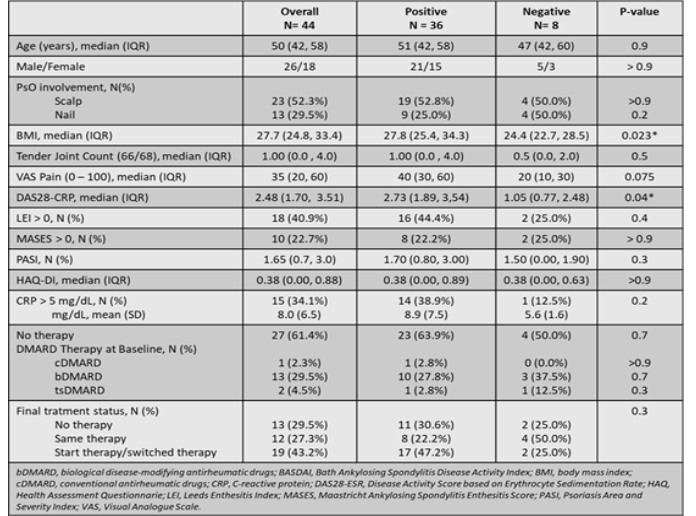Session Information
Session Type: Abstract Session
Session Time: 4:00PM-4:15PM
Background/Purpose: 68Ga-FAPI-04 PET/CT reveals fibroblast activation in vivo and is increasingly used to assess rheumatic diseases, including inflammatory arthritides. (1,2) We previously demonstrated that the synovio-entheseal 68Ga-FAPI-04 uptake is increased in psoriasis (PsO) patients with arthralgia. (3) We now report the risk of PsA development with 68Ga-FAPI-04 uptake in a longitudinal cohort of PsO patients at risk.
Methods: PsO patients with arthralgia but without arthritis/enthesitis underwent a whole-body 68Ga-FAPI-04 PET/CT scan. We evaluated 34 synovial, 34 enthesial and 5 axial sites for 68Ga-FAPI-04 uptake using the maximal standardized uptake value (SUVmax) and PET/CT Joint Index (PET-JI) (2), both calculated at each site individually and cumulatively at all sites. Patients were considered “68Ga-FAPI-04 positive” when a PET-JI ≥2 was detected at least at one site. Subsequently, patients were examined by a rheumatologist every 3 months or in case of symptoms worsening or reported joint swelling. Only patients with a ≥6 months of follow-up were included in the evaluation. PsA diagnosis was based on the fulfillment of CASPAR criteria. We described sites and intensity of 68Ga-FAPI-04 uptake, compared the characteristics of 68Ga-FAPI-04 positive vs negative patients and performed survival analyses to estimate the risk of PsA development.
Results: We included 44 patients, 59% were male, the mean age was 50 years (IQR 42-58). Further baseline characteristics are summarized in table 1. We found relevant 68Ga-FAPI-04 uptake in 36 (81.8%) patients with a mean cumulative SUVmax of 22.4 (±23.8) and PET-JI of 13.6 (±13.8), most commonly around mechanically challenged large joints: greater trochanter (n=15), shoulder (n=14), ankle (n=13), knee (n=13) and acromioclavicular joints (n=12), spinous process of the L5 vertebra (n=10). 68Ga-FAPI-04 positive patients had significantly higher BMI (p=0.023) and DAS28-CRP (p=0.04), driven by higher patient global VAS and CRP levels. During a mean follow-up of 42 (±41) weeks, 18 patients (41%) developed PsA. 17/36 (47%) patients with a 68Ga-FAPI-04 positive scan at baseline were PsA progressors, whereas only 1/8 (13%) without FAPI uptake developed PsA ((HR 6.55, 95%CI 0.85-50.8), log-rank p-value=0.04). Although not statistically significant (p=0.33 and 0.34), PsA progressors had higher mean cumulative SUVmax (27.0 ±26.8) and PET-JI (16.0 ±15.6) compared to non-progressors (SUVmax: 19.4 ± 21.6) (PET-JI: 11.9 ±12.3).
Conclusion: This prospective study shows that fibroblast activation detected by 68Ga-FAPI-04-PET/CT is linked to a 6-fold higher risk of PsA development in PsO patients. Our data suggest that this imaging technique may be useful in identifying PsO patients at risk of PsA development, who may benefit from close monitoring and possible preventive interventions. References:Schmidkonz C, et al. Journal of Nuclear Medicine. 2023.Luo Y, et al. Radiology. 2023;307(3):e222052.Corte G, et al.. RMD Open. 2024 Jun 11;10(2):e004294
 Table 1. Demographics and patient characteristics compared by 68Ga-FAPI-04-PET/CT status
Table 1. Demographics and patient characteristics compared by 68Ga-FAPI-04-PET/CT status
.jpg) Kaplan-Meyer curves of PsA-free survival in PsO patients with positive 68Ga-FAPI-04-PET/CT scans (blue line) vs. negative 68Ga-FAPI-04-PET/CT scans (red line) at synovial and entheseal sites
Kaplan-Meyer curves of PsA-free survival in PsO patients with positive 68Ga-FAPI-04-PET/CT scans (blue line) vs. negative 68Ga-FAPI-04-PET/CT scans (red line) at synovial and entheseal sites
To cite this abstract in AMA style:
Corte G, Tascilar K, Atzinger a, Temiz A, Yalcin Mutlu M, Noversa de Sousa R, Raimondo M, Ramming A, Bayat S, Sticherling M, Kuwert T, Schmidkonz C, Schett G, Fagni F. Ga-FAPI-04 PET/CT reveals increased fibroblast activation in synovial and enthesial tissues of psoriasis patients with arthralgia and predicts the development of psoriatic arthritis [abstract]. Arthritis Rheumatol. 2025; 77 (suppl 9). https://acrabstracts.org/abstract/ga-fapi-04-pet-ct-reveals-increased-fibroblast-activation-in-synovial-and-enthesial-tissues-of-psoriasis-patients-with-arthralgia-and-predicts-the-development-of-psoriatic-arthritis/. Accessed .« Back to ACR Convergence 2025
ACR Meeting Abstracts - https://acrabstracts.org/abstract/ga-fapi-04-pet-ct-reveals-increased-fibroblast-activation-in-synovial-and-enthesial-tissues-of-psoriasis-patients-with-arthralgia-and-predicts-the-development-of-psoriatic-arthritis/
